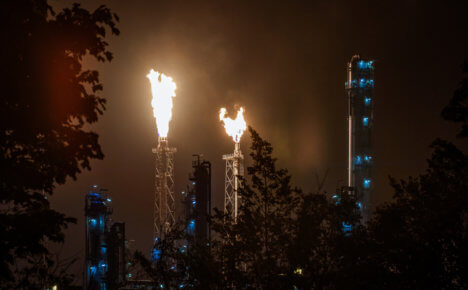
In Texas, oil and gas is big business, with many companies working directly or indirectly in the energy industry. At its core, the oil and gas industry is all about one thing: extracting energy sources and converting them into marketable products. As these natural resources are being extracted, they generally travel through three stages: upstream, midstream, and downstream. During the upstream portion of the process, oil is sought out and extracted from the ground. As part of the extraction process, associated gases come up from wells as a byproduct, much of which is worthless to upstream service providers as a profitable product. Therefore, oil and gas companies frequently dispose of gaseous waste through flaring.
What Is Oil and Gas Flaring?
Gas flaring refers to the combustion of gas generated during oil recovery. Gas flaring burns associated, unwanted, or excess gases and liquids released during the extraction process. A typical flare is composed of a boom or stack, which collects the unwanted gases to be flared. The composition of flared gas varies greatly depending upon what industrial process is underway during collection.
The energy industry utilizes flaring for multiple reasons, including:
- Pressure relief to prevent explosions
- Waste product removal
- Safe combustion of volatile organic compounds
- Lack of available pipeline or pipeline outages
- Companies producing more natural gas than they can handle
The Necessity of and Potential Liability for Flaring
Texas is America’s top gas-producing state, accounting for 51 percent of all flared or vented gas in the country in 2018, according to the U.S. Energy Information Administration. The Texas Railroad Commission received more than 27,000 requests for flaring permits during the past several years and has not denied any of them. This allows for hundreds of millions of cubic feet of natural resources to be burned off per day. Natural gas flaring in the top U.S. oilfield – the Permian Basin in Texas and New Mexico – reached record highs last year. Although producers would much rather sell this gas, flaring the gas that cannot be sold is better than releasing uncombusted gas into the environment. Nevertheless, companies with flaring operations may be subjected to claims related to the environment, property damage, and personal injury. In addition, the cybersecurity company Dragos found attacks targeting the global oil and gas industry are increasing along with the number of attackers.
Litigation Team For Oil and Gas Businesses
Energy companies need experienced representation they can trust from attorneys who understand the increasingly complex issues in their rapidly evolving industry. With offices across Texas, our firm covers every aspect of the energy industry. Our experience representing clients in diverse sectors of the energy industry allows us to effectively handle your legal issues. Our energy litigators have vast experience in a wide variety of energy disputes and in trying energy-related cases in state and federal courts and before arbitration panels.
